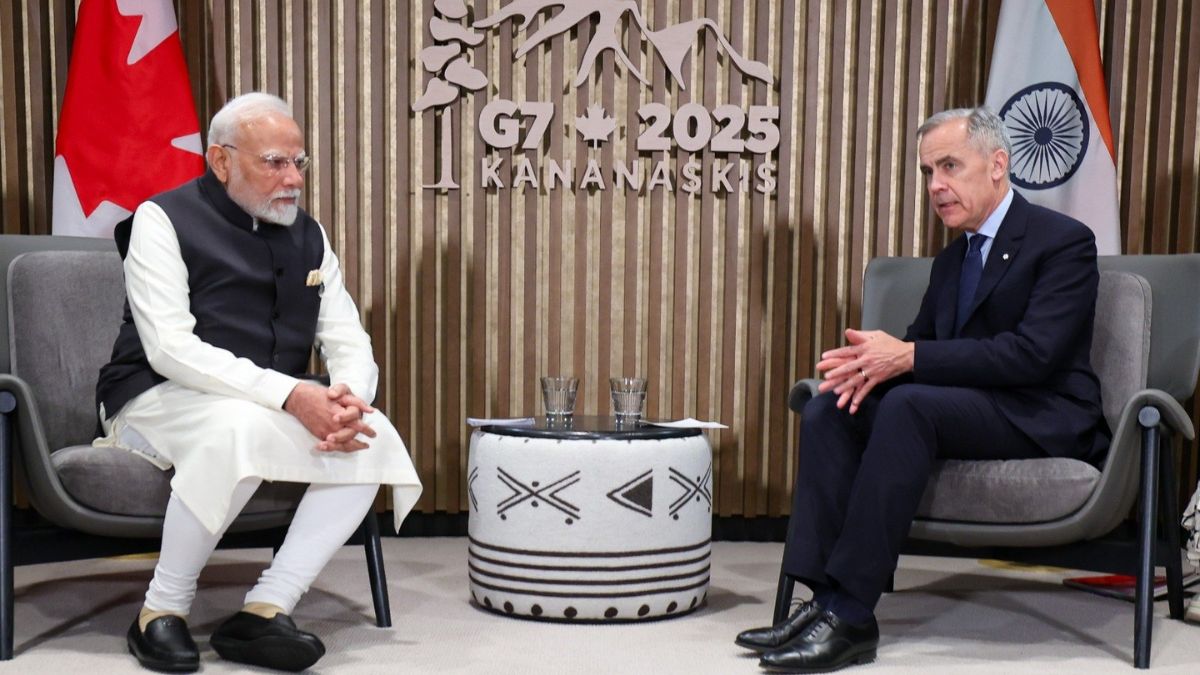Canada Accuses India Of ‘Foreign Interference’ Hours After Modi-Carney Reset Diplomatic Ties

Indian Prime Minister Narendra Modi met his Canadian counterpart Mark Carney on the sideline of G7 Summit in Kananaski. Image courtesy: X.com/@narendramodi
Just hours after Prime Minister Narendra Modi and his Canadian counterpart Mark Carney held a high-level meeting on the sidelines of the G7 summit in Alberta— signalling a thaw in strained diplomatic ties—a newly declassified Canadian intelligence report has accused India of foreign interference operations on Canadian soil.
The report, first disclosed by Reuters and attributed to the Canadian Security Intelligence Service (CSIS), has reignited concerns within sections of the Sikh diaspora and threatens to complicate the recent diplomatic overtures by both governments.
What does the CSIS report allege about India’s activities in Canada?
According to the report, India has been labelled a “perpetrator of foreign interference,” with CSIS alleging that:
- Transnational repression is “central to India’s actions in Canada.”
- Indian officials and local proxies have attempted to influence Canadian political figures and community groups to align Ottawa’s policies more closely with New Delhi’s interests.
- These efforts are particularly focused on countering pro-Khalistan groups—Sikh separatists seeking an independent state in Punjab—who are active in Canada.
The report reiterates that China remains Canada’s top counter-intelligence concern, followed by Russia, Iran, Pakistan, and now India.
How does this report impact the Modi-Carney meeting at the G7?
The timing of the CSIS report’s release is sensitive. Just hours before it became public, Modi and Carney held what officials from both sides described as “constructive” talks in Alberta. They agreed to restore top diplomats withdrawn in 2023, when bilateral relations deteriorated sharply and reset diplomatic channels and improve cooperation after nearly a year of frostiness.
However, Carney’s outreach to Modi has drawn criticism from segments of the Sikh community in Canada, who continue to demand accountability for the killing of Hardeep Singh Nijjar, a pro-Khalistan figure designated a terrorist by India but seen by supporters in Canada as an activist.
What triggered the India-Canada diplomatic fallout in 2023?
Tensions escalated in September 2023 when then-Prime Minister Justin Trudeau alleged in Parliament that Indian agents were involved in Nijjar’s killing in British Columbia. India denied any role in the assassination and responded by accusing Canada of being soft on extremist Sikh separatist elements that promote anti-India narratives.
Subsequent revelations by the Royal Canadian Mounted Police (RCMP) indicated that over a dozen threats had been issued against Sikh activists in Canada, drawing greater scrutiny of India’s activities.
Despite the controversies, India maintained that its primary concern remains the protection of its sovereignty and national unity, particularly from separatist movements operating from foreign soil.
Has India responded to the latest CSIS report?
As of now, no official comment has been issued by either the Indian High Commission in Canada or the Chinese Embassy, which was also mentioned in the CSIS report.
India has consistently argued that its engagement with diaspora communities is legal, transparent, and in line with international norms, while condemning what it views as politically motivated accusations lacking substantive proof.
The report’s release, coming amid a fragile diplomatic reset, may pose new challenges to India-Canada relations—already among the most turbulent in the G7’s geopolitical landscape.







